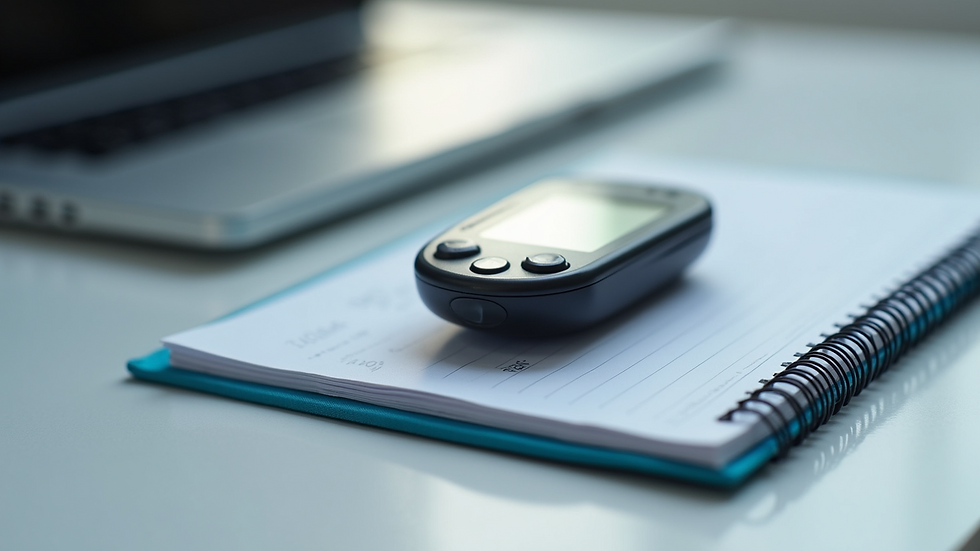Effective Strategies for Managing Type 2 Diabetes
- drperrone2021
- May 11, 2025
- 3 min read
Living with type 2 diabetes can be a challenging journey, but with effective strategies, individuals can lead a healthy and fulfilling life. This blog post will explore actionable methods for managing diabetes effectively, focusing on lifestyle changes, monitoring, and treatments that can make a difference.
Diabetes Management: Understanding the Basics
Managing diabetes is not just about taking medication; it involves a combination of lifestyle changes, dietary adjustments, and regular health monitoring. The first step in diabetes management is understanding how food, exercise, and medication interact with blood sugar levels.
For instance, individuals with type 2 diabetes often have insulin resistance, meaning their bodies do not use insulin effectively. Understanding the role of carbohydrates, proteins, and fats in blood sugar management is crucial. Keeping track of what you eat can help you make healthier choices.

The Importance of Regular Monitoring
Regular monitoring of blood glucose levels is essential for anyone with type 2 diabetes. Self-monitoring allows individuals to see how their food, exercise, and medications affect their blood sugar. This insight can help in making informed choices and adjustments to daily routines.
For effective monitoring, consider the following tips:
Check Blood Sugar Frequently: Regular checks can help identify patterns and triggers that cause fluctuations.
Keep a Log: Document your readings, meals, exercises, and how you feel. This information can provide valuable insights for discussions with your healthcare provider.
Use Technology: Many apps and devices can help track blood sugar levels effortlessly. Choose one that fits into your daily routine.

Which Treatments Would Most Likely Be Recommended for Type 2 Diabetes?
When it comes to treatment options for type 2 diabetes, a healthcare provider will usually recommend lifestyle changes first. However, if those aren't sufficient in controlling blood sugar, medication may be necessary. Treatments may include:
Oral Medications: These are often the first step in managing diabetes. Medications like metformin help improve insulin sensitivity and lower blood sugar levels.
Insulin Therapy: Some individuals with type 2 diabetes may require insulin injections to help manage their sugar levels effectively.
Bariatric Surgery: For those with obesity, surgical options may be considered to help control diabetes. Studies show a significant reduction in blood sugar levels post-surgery.
It’s essential to consult with a healthcare professional to determine the best course of action tailored to your specific needs and lifestyle.
Diet and Nutrition Tips
Diet plays a significant role in diabetes management, and the type of food consumed can make a substantial difference in blood sugar levels. Here are some dietary tips:
Prioritize Whole Foods: Focus on fruits, vegetables, whole grains, lean proteins, and healthy fats. Whole foods are nutrient-dense and often have a lower glycemic index.
Avoid Sugary Beverages: Sugary drinks can cause significant spikes in blood sugar. Opt for water, herbal teas, or other unsweetened drinks.
Watch Portion Sizes: Eating controlled portions can help regulate caloric intake and keep blood sugar levels stable. Consider using smaller plates to help with portion control.
Balance Your Plate: Aim to fill half your plate with vegetables, a quarter with lean protein, and a quarter with whole grains.

Physical Activity and Its Impact
Exercise is another critical component in managing type 2 diabetes. Physical activity can help lower blood sugar levels, improve insulin sensitivity, and promote weight loss. Here are some practical strategies to incorporate exercise into your routine:
Find Activities You Enjoy: Whether it’s walking, cycling, swimming, or dancing, choosing enjoyable activities will make you more likely to stick with them.
Consistency is Key: Aim for at least 150 minutes of moderate aerobic activity each week. Incorporate strength training at least twice a week.
Set Realistic Goals: Start small and gradually increase your activity level. Setting achievable goals can help keep you motivated.
Make It Social: Engage friends or family in your exercise routine. This social interaction can make physical activity more enjoyable.
Managing type 2 diabetes effectively involves several key strategies, including regular monitoring, dietary adjustments, exercise, and potential treatment options. For comprehensive approaches, consider exploring type 2 diabetes therapy. This pathway might include personalized recommendations and professional advice to propel your management plan successfully.
By taking charge of your health through these strategies, you can lead a fulfilling life and effectively manage your type 2 diabetes. Remember, small changes can lead to significant improvements over time. Stay informed and proactive in your diabetes care!



Comments